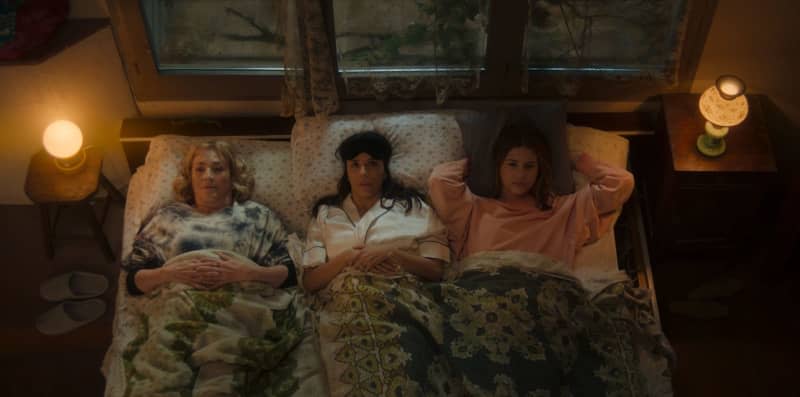'Land of Women' on Apple TV+: A lovely and satisfying escape

As a professional reviewer of television I am regularly asked "What should I watch?" — a question I answer with the question, "Well, what do you like?" One can discuss the quality, the technique, the structure of a series in a relatively objective, analytical way, but taste is a matter of … taste. Some celebrated series that attract awards like a magnet does iron filings, while I might praise their craft and artfulness, are just not my thing. I might find them admirable yet not exciting. Every critic knows the feeling.
Indeed, were I to catalogue my favourite series over the years since I started thinking seriously about television, it would be heavy on single-season flops, offbeat comedies, strange children's shows and lo-fi art projects. (I will make you that list sometime, but you will surely find "Food Party" on it.) It would favour the light and lovely over the dark and gritty, and stories of ordinary folks over the rich and powerful — people who make things rather than just own things, lovers not schemers.
Currently, I am in love with "Land of Women," a dramatic-romantic family comedy starring Eva Longoria and Carmen Maura (la reina de las películas de Pedro Almodóvar), which premiered at the end of June on Apple TV+. I find it thrilling not so much for its plot — which is, indeed, a little bit of a thriller and doesn't always make real-word sense — but for its luminous cast, and the humble splendor of its setting, a village in the mountains northeast of Barcelona. (I am, admittedly, a sucker for Spain.) It's the sort of story whose constituent parts have been shuffled many times over the years, as often as not with middling results — but when done well, as in Hollywood's golden age, and here, can stay fresh for decades.
Longoria plays Gala, a wealthy New Yorker opening a super-fancy wine shop. Significantly, she doesn't come from money, but she has adopted the colouration of present environment, where she thinks nothing of buying three copies of a couture dress without asking the price.
The money comes from her real estate developer husband Fred (James Purefoy), but — surprise — there is none. As Gala attends to the opening of her wine store, she is approached by a pair of thugs, who we will come to know as Hank (Jim Kitson), the relatively more thuggish one, and Kevin (Amaury Nolasco), the comparatively sweeter one. They let her know that unless this debt is repaid in very short order, her daughter Kate (gifted newcomer Victoria Bazúa) and mother Julia (Maura) are as good as dead. And so, as Fred lights out for parts unknown, even to Gala, she hustles Kate and Julia off to (fictional) La Muga, the Catalan town Julia abruptly left behind half a century before.
As to Fred, we know he's going to prove disposable even before La Muga's most, possibly only handsome man, Amat (Santiago Cabrera), encounters Gala in an automotive meet-cute, when she runs his tractor off the road, spilling the load of grapes he was hauling; he's the sole element in the town industry, winemaking, run by a cooperative of women. In classic form, they begin as antagonists that the writers contrive to keep at close quarters, which is to say, they are potential love interests, and if this is predictable, it is is also satisfying. It's no spoiler to say that Purefoy won't wind up with Longoria, anymore than Rosalind Russell, Carole Lombard and Ginger Rogers would choose Ralph Bellamy over Cary Grant, Fred McMurray and Fred Astaire. I mean, you would tear down the screen.
Dislocation is piled upon dislocation. Each woman, though they will literally be in bed together, has her own business to pursue. Julia, knowing about wine, has ideas about the local product — it stinks — which sets her against most of the town, but gives her a mission. Julia, we're told, is on the edge of dementia; she has a tendency to flash back into her flirty, free-spirited past, adding a poignant element of time. She's remembered, not necessarily well, by her former neighbors and has bad blood with her sister Mariona (Gloria Mu?oz), but she looks upon everything with wide-eyed joy; Maura seems actually to glow. And Kate, who like Bazúa is trans, deals with the absence of her father, her American girlfriend and her cellphone, which Gala tosses out the window in a fit of pique. And trouble will, of course, follow them from across the ocean.
Created by Ramón Campos, Teresa Fernández-Valdés and Gema R. Neira from, though not following, the novel "La tierra de las mujeres" by Sandra Barneda and performed mostly in Spanish, the series has a European quality — not just for its setting, but in the matter-of-factness of its production and pacing. Its fairy-tale, feel-good elements are naturalistically framed, which makes it enchanting on the one hand and genuinely moving on the other, and keeps it from corniness — even when it's predictable, it isn't obvious.
Directed largely by Carlos Sedes, "Land of Women" stays remarkably focused, addressing its overlapping affairs without dissipating its energy, or, as is so often the case with streaming series, wasting time on unprofitable tangents. And there is, of course, the raw touristic appeal. "Land of Women" belongs to a whole class of films and series in which city people go to the country, or to another country, to learn they've been doing life wrong — something many if not most of us may have suspected sometime.

